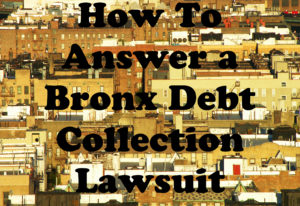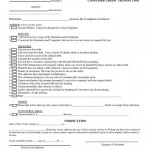By: Robert J. Nahoum
THE PROBLEM:
You’ve come home from a long day at work and find papers taped to your door. You take a closer look and realize you are being sued in the New York City Civil Court, Bronx County a by a debt collector who says you failed to pay an old debt. Now what do you do?
The Rule:
In the Bronx, most debt collection lawsuits are filed in the Civil Court where, by some estimates, nearly 95% of debt collection lawsuits are won by default. While many of these defaults occur due to improper service of the summons and complaint, the remaining defaults happen for other reasons. For some, they can’t get the time off from work to deal with it but for others, they simply ignore the case. In either event, the results are the same – a default judgment.
WHAT YOU SHOULD DO:
If you’ve been sued and are reading this article, then you are on your way to being among the 5% of consumers who do not lose by default. The first things you should do is determine whether or not to hire a lawyer. Sometimes the amount you’ve been sued for doesn’t justify the expense of a lawyer while other times you just don’t have the money to pay for one.
If you’ve decided not to hire a lawyer to defend you, follow these steps to avoid defaulting on a Bronx debt collection lawsuit and preserve your rights:
STEP 1
The first step in avoiding default is answering the complaint. To do this you will need to get the pro se (self represented) answer form.  The form can be downloaded here or you can go to the pro se window at the clerk’s office in the courthouse and ask for a copy.
Next you need to fill out the form fist by writing in the names of the parties (the debt collector is the plaintiff and you are the defendant) and the index number. Then you will check the general denial box if you are denying the allegations of the complaint. You then assert your defenses by checking the appropriate boxes.  A defense is an explanation by you of why the Plaintiff is wrong and why you should win the lawsuit. If you do not include certain defenses, you may be waiving your right to rely on them later.
The most commonly used affirmative defenses include:
- Lack of personal jurisdiction – meaning that you were not properly served with the summons and complaint.
- Statute of Limitations – meaning that the debt is too old to sue on (usually 6 years in New York);
- Standing – Meaning that you don’t have a relationship with the Plaintiff and it is not the party that has the right to sue you;
- Accord and Satisfaction – meaning that you already settled and paid the debt;
- Usury – meaning that the amount of interest you are being charged sought exceeds the rate permitted by law;
Finally, you must determine if you have any counterclaims against the plaintiff. A counterclaim flips the script and allows you to make a claim for damages against the debt collector. The most common counterclaim to a debt collection lawsuit is one for violations of the Fair Debt Collection Practices Act (FDCPA). The FDCPA regulates the collection of consumer debts and precludes third party debt collector from using false, misleading, deceptive and harassing debt collection tactics. If a debt collector violates the FDCPA, you can sue for statutory damages up to $1,000.00 plus actual damages (like pain and suffering) and your attorney’s fees.
STEP 2
The second step in avoiding default in a Bronx debt collection lawsuit is serving a copy of the answer on the debt collector’s attorney.
You have 30 days to serve your answer if the complaint was personally delivered to you or another adult in your home or 30 days if it was delivered to you some other way. You can mail your answer by regular mail but the better practice is to use certified mail return receipt requested so you can prove that you sent it on time.
STEP 3
The third and final step in avoiding default in a Bronx debt collection lawsuit is filing a copy of the answer with the court including proof of service. Service is proven by completing an “affidavit of serviceâ€. This is another form that you can get from the pro se window at the clerk’s office in the courthouse or you can download it here. You then mail or deliver the answer with the affidavit of service to the court. The Bronx County Civil Court address is: 851 Grand Concourse #111, Bronx, NY 10451.
That’s all there is to it, follow these steps and you should avoid default. However, keep in mind, once the answer is served and filed you’ve only avoided default for the time being.  This is only the first step in defending yourself in a debt collection lawsuit.
If you need help settling or defending a debt collection law suit, stopping harassing debt collectors or suing a debt collector, contact us today to see what we can do for you. With office located in the Bronx, Brooklyn and Rockland County, the Law Offices of Robert J. Nahoum defends consumers in debt collection cases throughout the Tristate area including New Jersey.
The Law Offices of Robert J. Nahoum, P.C
(845) 232-0202
www.nahoumlaw.com
www.BronxDebtDefense.com
www.BrooklynDebtDefense.com
www.NYDebtDefense.com
www.NJDebtDefense.com


